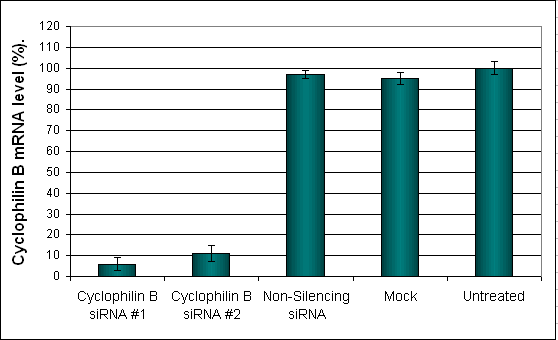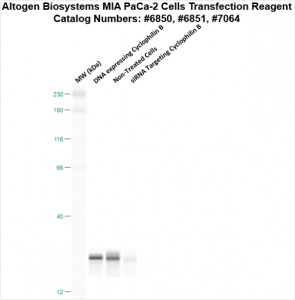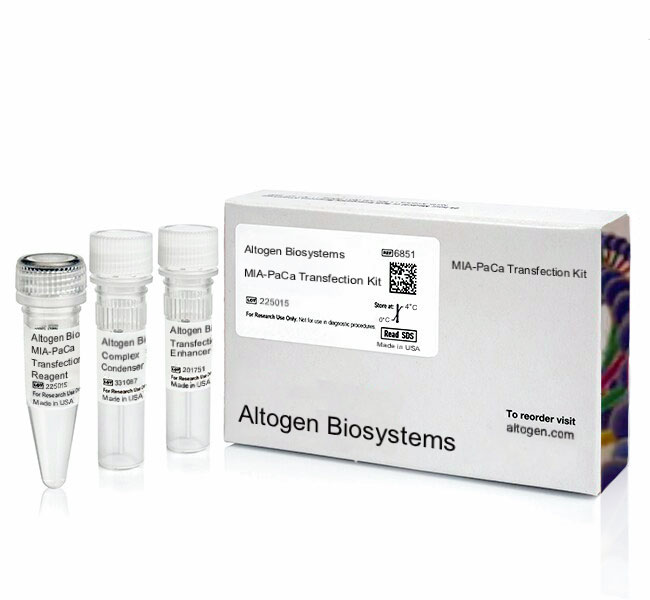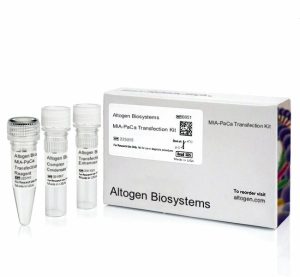Description
Purchase Orders: Click “Add to Cart” button to order, then email PO to orders@altogen.com.
Product Availability: In Stock.
Transfection Reagent for MIA PaCa-2 Cells (Pancreatic Carcinoma Cells, CRL-1420)
- Proprietary cationic lipids formulation
-
High transfection efficiency of small RNA (siRNA, shRNA, miRNA), mRNA, pDNA
-
Effective and robust intracellular delivery
-
Work in the presence of serum
-
Optimized transfection protocols are adapted for use with both standard & reverse transfection methods
-
Download in vitro MiaPaCa2 transfection protocol: [PDF]
- Download MiaPaCa2 CRISPR/Cas9 transfection protocol: [PDF]
-
Download PowerPoint presentation for Mia-PaCa-2 cells transfection kit: [PPT]
- UPC/GTIN/EAN: 860002089790
-
Brand: ALTOGEN®, developed and manufactured by Altogen Biosystems
Transfection Efficiency:
Reagent exhibits at least 88% transfection efficiency of siRNA delivery. Transfection efficiency was determined by RT-PCR.
Product Description:
Pre-optimized transfection kit for high transfection efficiency of MiaPaCa-2 cell line, a human pancreatic cancer cells. Transfection reagent is compatible with DNA and RNA transfection.
Transfection Protocol and SDS:
Download Altogen Biosystems MiaPaCa-2 Transfection Protocol: [PDF]
Download SDS: [PDF]
MIA PaCa-2 Cell Line:
MiaPaCa-2 is a pancreatic cancer cell line that was originally isolated from the pancreas of a 65-year-old Caucasian male with pancreatic ductal adenocarcinoma. These cells are widely used as a model system for studying pancreatic cancer biology and for testing potential therapeutic agents. MiaPaCa-2 cells are characterized by their ability to grow as adherent monolayers in vitro and to form tumors when injected into immunocompromised mice. They exhibit several features characteristic of pancreatic cancer, including uncontrolled proliferation, resistance to apoptosis, and invasion. MiaPaCa-2 cells also express high levels of several markers of pancreatic cancer, including CA19-9 and mucin-1. MiaPaCa-2 cells have been used extensively to study the molecular mechanisms underlying pancreatic cancer progression and metastasis. For example, they have been used to study the role of various signaling pathways, such as the Ras-MAPK and PI3K-Akt pathways, in promoting pancreatic cancer cell growth and survival. They have also been used to study the mechanisms underlying drug resistance in pancreatic cancer, which is a major obstacle to successful treatment of this disease. In addition, MiaPaCa-2 cells have been used to screen for potential anticancer agents, including chemotherapy drugs and targeted therapies. Studies using these cells have led to the development of several drugs that are currently in clinical trials for the treatment of pancreatic cancer, including gemcitabine, nab-paclitaxel, and erlotinib.
Pancreatic adenocarcinoma is an aggressive malignancy that is often advanced at the time of initial diagnosis due to the lack of early symptoms and reliable screening tests as well as rapid progression of the disease. Established cell lines have proven to be a useful tool for investigating the epidemiology of pancreatic cancer. The MIA PaCa-2 cell line was initially isolated by A. Yunis et al. in 1975 using pancreatic tumor cells of a 65-year-old Caucasian male with pancreatic carcinoma. The tumor was negative for an alkaline phosphatase stain and did not express high amounts of carcinoembryonic antigen. This is a hypotriploid cell line with floating rounded cells that display epithelial morphology. MIA PaCa-2 cells produce plasminogen activator and human colony-stimulating factor (CSF-1). The modal chromosome number for this cell line is 61, and a few normal chromosomes are absent. MIA PaCa-2 has a doubling time of roughly 40 hours and is an excellent host for biomedical research related to pancreatic cancer. Altogen Biosystems provides lipid-based transfection reagent kits for the MIA PaCa-2 cell line.
Cell line mutations:
| KRAS | 3845 | 37 | 12 | 25398285 | 25398285 | Missense_Mutation | SNP | C | A |
| TP53 | 7157 | 37 | 17 | 7577539 | 7577539 | Missense_Mutation | SNP | G | A |
| ZNF623 | 9831 | 37 | 8 | 144733541 | 144733541 | Missense_Mutation | SNP | C | A |
| SGMS1 | 259230 | 37 | 10 | 52103484 | 52103484 | Nonsense_Mutation | SNP | C | A |
| NR1I3 | 9970 | 37 | 1 | 161200619 | 161200619 | Nonsense_Mutation | SNP | G | A |
| ADAMTS3 | 9508 | 37 | 4 | 73186526 | 73186526 | Missense_Mutation | SNP | G | A |
| KMT2C | 58508 | 37 | 7 | 151945349 | 151945349 | Nonsense_Mutation | SNP | T | A |
| OR5P2 | 120065 | 37 | 11 | 7818247 | 7818247 | Missense_Mutation | SNP | G | C |
| OR4A15 | 81328 | 37 | 11 | 55135756 | 55135756 | Missense_Mutation | SNP | C | A |
| OR5AS1 | 219447 | 37 | 11 | 55798847 | 55798847 | Missense_Mutation | SNP | G | A |
| CTAGE5 | 4253 | 37 | 14 | 39746268 | 39746268 | Splice_Site | SNP | C | G |
| ERG | 2078 | 37 | 21 | 39795450 | 39795450 | Silent | SNP | G | A |
Data:

Figure 1. Cyclophilin B silencing efficiency was determined by RT-PCR in the MIA Paca-2 cells transfected by Cyclophilin B siRNA or non-silencing siRNA control following the recommended transfection protocol. Cyclophilin mRNA expression levels were measured 48 hours post-transfection. 18S rRNA levels were used to normalize the Cyclophilin B data. Values are normalized to untreated sample. Data are presented as means ± SD (n=6).

Figure 2. Protein expression of Cyclophilin B in MIA PaCa-2 cells. DNA plasmid expressing Cyclophilin B or siRNA targeting Cyclophilin B were transfected into MIA PaCa-2 cells following Altogen Biosystems transfection protocol. At 72 hours post-transfection the cells were analyzed by Western Blot for protein expression levels (normalized by total protein, 10 µg of total protein loaded per each well). Untreated cells used as a negative control.
Altogen Biosystems manufacturers over 100 pre-optimized in vitro transfection kits for cancer cell lines and primary cells, elecroporation products, and tissue-targeted in vivo delivery reagents for life science research. Advanced formulation of reagents and optimized transfection protocols provide efficient intracellular delivery of protein, DNA, mRNA, shRNA and siRNA molecules. Read more about transfection technology at Altogen’s Transfection Resource. Altogen Labs provides safety and efficacy preclinical research services. GLP-compliant studies for IND applications, and drug development, including over 90 in-house validated xenograft models, safety toxicology, etc (visit AltogenLabs.com).
Volume Options:
- 0.5 ml (Catalog #6850)
- 1.5 ml (Catalog #6851)
- 1.5 ml CRISPR (Catalog #2174)
- 8.0 ml (Catalog #7064)
Purchase Orders: Click “Add to Cart” button to order, then email PO to orders@altogen.com.
Product Availability: In Stock.






